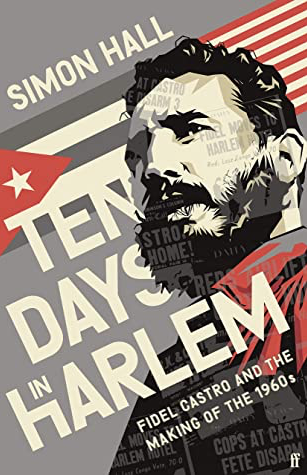Ten Days in Harlem: Fidel Castro and the Making of the 1960s by Simon Hall
My rating: 3 of 5 stars
This is a 3.5 of 5.

In 1960, Fidel Castro, relatively fresh from the overthrow of Batista travels to New York to address the UN General Assembly. He spends Ten Days in Harlem at the Hotel Teresa and Simon Hall uses this as a focus to explore tangential aspects of the 1960s, anti-imperialism, and the evolution of the cold war quest for axes of control between the US and the USSR.
In short, Hall gives a light coverage of the various meetings that took place during those ten days as a means of illuminating various tangents. There is an interspersion of quotes from personages involved, references to various contemporary historical events, and a temporal skeleton. He does a good job of identifying the importance of the place and the personages of the meetings but provides little colour or ambiance – where this is a great opportunity to do so. He makes a few interesting assertions around accidental seizing of opportunities by Castro, Kruschev, and Nasser to embellish or exposit appearances for political appeal. Castro is cast as somewhat wet behind the ears in arriving at the US, but quickly gaining schooling in international showmanship.
This is a good, but easy read. I am glad to have read but come away wondering if I shouldn’t have learned more given the volume of scholarship. Coming from an academic, the entire work is well cited (I found the footnoted between each chapter needlessly disruptive to the narrative) although at the end one feels that there were more citations than content. The ten days are significant, but to me, there was potentially unrealised to have teased out the greater significance and possibly been able to capture more of the atmosphere which must have been palpable.
All in all, the presentation is tepid and dry where it presented an opportunity for greater drama and storytelling. The is also a sense, in the brevity (although sources re heralded), that the breadth of sources is limited and that the presentation not only one-dimensional but also lacking nuance. Conclusions don’t inspire discussion – things are cut and dried.
My criticisms are subjective. What might a historian author such as Éric Vuillard do with this as presentation as a stage play rather than a templated documentary….hmm?
